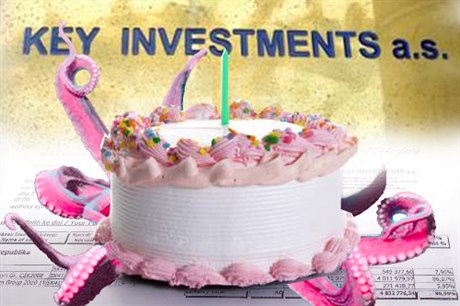Exactly a year ago, Czech Position was the first publication to report on the scandal surrounding the Key Investments brokerage, which could be dubbed as the Czech equivalent of the Bernie Madoff case. While the US finance fraudster received a 150-year prison sentence, the main protagonists in the Czech scandal remain free — thanks to the level of morality and expertise in the Czech police and judiciary.
The Czech police’s anti-corruption and financial crimes unit has been investigating several criminal complaints relating to Key Investments for more than a year now, but not a single person has been charged, let alone prosecuted.
The case is nevertheless major with all the right attributes for media attention: large sums of money, corruption in high politics, dirty local deals clinched in town halls, “godfathers” from the Prague chapters of the largest Czech political parties — the center-right Civic Democrats (ODS) and center-left Social Democrats (ČSSD) — influential lawyers who work for all political parties, dubious auditors, secret owners of the Slavia Prague football team, the controversial businessman Petr Sisák who has a past conviction for fraud, nontransparent firms with front companies in the Virgin Islands, and unsellable, probably illegally emitted bonds bought by the administrations of Prague 6, 10 and 13 with hundreds of millions of public funds.
According to Czech Position’s latest information, there is yet another chapter to the story – a powerful financial group that is said to be guarding Key Investment’s invaluable archive in a safe.
A scandal too complicated
Many Czechs are in the picture when they hear Madoff’s name, but for the most part have no idea about what the Key Investments scandal is about.The Czech-language version of this publication alone has published 125 articles about the Key Investments scandal. Some other media, most notably the business daily Hospodářské noviny (HN) and biggest-circulation broadsheet, Mladá fronta dnes (MfD), also took up the case, but the country’s television stations and the tabloids have only mentioned the story in passing; therefore, a wider public outcry could not be expected.
It’s true that the Key Investments case is very complicated and understandably the tabloid Blesk (the nation’s best-selling paper) and the commercial station TV Nova are unable to summarize it in a few paragraphs or minutes, respectively. Unfortunately, state-controlled Czech Television (ČT) only gave fleeting coverage to the affair. Therefore it’s not surprising that many Czechs are in the picture when they hear Bernie Madoff’s name, but for the most part have no idea what the Key Investments scandal is all about.
Several years ago, Key Investments got involved in dealing in private obligations issued by firms with which the brokerage had links, including E Side Property and the Via Chem Group. The brokerage then proceeded to buy these high-risk junk bonds on behalf of Prague 6, 10 and 13 (all ODS-controlled) and other municipal and district administrations. In all, the administrations entrusted around Kč 1 billion of public funds to the brokerage. Apart from the Prague administrations, the towns of Sokolov and Votice and President Václav Klaus’ right-wing think-tank, the Center for Economics and Politics (CEP), also entrusted funds to the brokerage.
Around half a year ago, Prague 13 mayor David Vodrážka (ODS) managed, with the services of lawyer Jan Pacovský, to retrieve Kč 200 million of his district’s money from Key investments, but the circumstances of how this was arranged are not public. Who transferred the money? In whose interest was it that Prague 13 received most of its money back and part of the problem banished?
Klaus’ CEP had “luck” in getting its investment back, whereas Prague 6 and 10 still have hundreds of millions of taxpayers’ money tied up in non-tradable, high-risk, bonds, thanks to the dodgy brokerage, which is also being investigated by the Czech National Bank (ČNB).
Put simply, over Kč 1 billion of public funds was used to finance the commercial activities of private companies with nontransparent ownership structures. Isn’t that newsworthy?
Arrogance
President Klaus’ advisor and close associate Weigl certainly has many answers but has refused to answer any questions relating to the affairNone of the politicians implicated in the scandal has resigned or even admitted publically that they made an error. This impertinence and arrogance stems from given certainties: these politicians have such great protection from the highest places that they’re seemingly untouchable.
Those implicated in the affair are all known to Czechs who take a degree of interest in domestic politics: Minister of Environment and formerly long-term mayor of Prague 6 Tomáš Chalupa (ODS), Prague 10 Mayor Milan Richter (ODS) and one of his predecessors, Antonín “Tony” Weinert (Social Democrats, ČSSD); Mayor of Prague 13 and Chairman of the lower house of parliament’s foreign affairs committee David Vodrážka (ODS); and presidential chancellor Jiří Weigl, who was formerly the director of Key Investments’ former front parent company registered in the UK.
Over the past year, nothing has happened to anyone involved in the affair. It looks probable that nothing will. Politicians in the administrations effected do not seem to be trying too hard to get the public funds back. They still don’t know who owns Key Investments or the firms into whose nontransferable bonds they or their colleagues and predecessors invested hundreds of millions. Or perhaps they know very well — but are afraid to come out with the truth.
President Klaus’ advisor and close associate Weigl certainly has many answers, but he has refused to respond to any questions relating to the affair. Is this arrogance? Yes. As another example, Prague 10 has refused since last spring to answer any questions about the Key Investments case.
The Czech central bank, the regulator of Czech financial markets, and the arbitration court of the Prague Stock Exchange (PSE) appear to have made only half-hearted, cursory efforts to intervene in the Key Investments affair. In response to a complaint lodged by the coal mining firm Sokolovská uhelná, which lost almost Kč 40 million it invested with the brokerage, the ČNB launched an investigation into Key Investments way back in August 2010, but has not come up with anything. The only apparent action the regulator has taken is to suspend Key Investments’ license as a brokerage.
“The fact that even more than a year after we submitted our complaint the enquiry has still not been completed highlights the fact that in this case the ČNB has repeatedly failed to fulfill its legal responsibilities which include protecting clients against entities which don’t adhere to licensing regulations,” Radek Pokorný, the head of the legal firm Pokorný/Wagner & spol., which represents Sokolovská uhelná, told Czech Position.
The arbitration court of the PSE has still not come up with a verdict as to whether Key Investments’ management of Sokolovská uhelná’s cash was in line withfinancial regulations.
Potential for blackmail
Only the owner of Key Investments’ books knows to what extent which politicians and political parties are involved in the affair.Key Investments last caught wider media attention in November 2011, when Martin Kocourek (ODS) was forced to resign as minister of industry and trade, reportedly because of the affair surrounding the brokerage. This was not accurate: Kocourek would have been forced to step down even if he invested his own, or family, money in the most renown and respected investment firm under the sun. The minister resigned because as he himself admitted, he essentially concealed money from his ex-wife during divorce proceedings.
Nevertheless, Key Investments played a central role in Kocourek’s downfall. It appears he fell out of favor with the keeper of the brokerage’s books and was thus ejected.
Sometimes Czech Position readers ask us why don’t continue to report on Key Investments with the same intensity as in the spring of 2011. This question leads to another question: how and in which direction? In the 125 articles we have written about the affair thus far, we have reported everything a journalist could ascertain. It should now be the turn of the police, the state prosecution service and the financial regulators in the ČNB.
Unfortunately, it appears that for the most part the functioning of the institutions mentioned is influenced by high politics which doesn’t have the slightest interest in bringing to account those responsible for the financial machinations. The motto is clear: who else would those high-placed politicians do business with?
Only the owner of Key Investments’ books knows to what extent which politicians and political parties are involved in the affair. And everyone involved is very afraid of that puppet master who holds the key to the safe containing the brokerage’s records. Who from them wants to end like Kocourek? Obviously none of them. Thus they choose to tow the line.
— All previous articles about Key Investments are archived here





